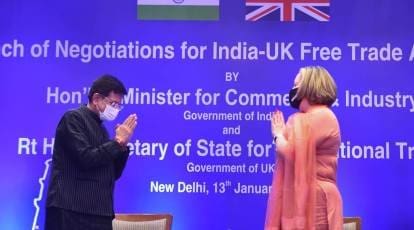Negotiations on the India-UK free trade agreement show no signs of slowing down, according to a senior official. The 13th round of talks, which started in September, is ongoing, albeit in a virtual format. The official, who prefers to remain anonymous, confirmed that negotiators are working without a fixed deadline.
The discussions for the free-trade agreement began in January 2022, with an original target to conclude talks by Diwali on October 24, 2022. However, due to political developments in the UK, this deadline was missed. Currently, there are 26 chapters under negotiation, covering topics such as goods, services, investments, and intellectual property rights.
Simultaneously, an investment treaty is also being negotiated alongside the FTA as a separate agreement.
According to the official, the majority of chapters are either closed or in advanced stages of negotiation. Less contentious issues have been addressed, but there remains ongoing deliberation on matters of interest to India.
These include seeking greater access for skilled Indian professionals from sectors such as IT and healthcare in the UK market. Additionally, India is pushing for market access with nil customs duties for specific goods. Conversely, the UK is aiming for reduced import duties on items such as scotch whiskey, automobiles, lamb meat, chocolates, and certain confectionery items.
The UK is also seeking more opportunities in Indian markets for services like telecommunications, legal, and financial services, including banking and insurance. During negotiations, the UK is demanding national treatment for its service businesses and greater freedom for its professionals to operate within India.
National treatment refers to treating foreigners and locals equally regarding rules and regulations, ensuring equal access to opportunities for overseas operators without putting them at a disadvantage.
Despite challenging negotiations, both countries remain committed to achieving an agreement that benefits their respective economies and strengthens bilateral trade ties.

